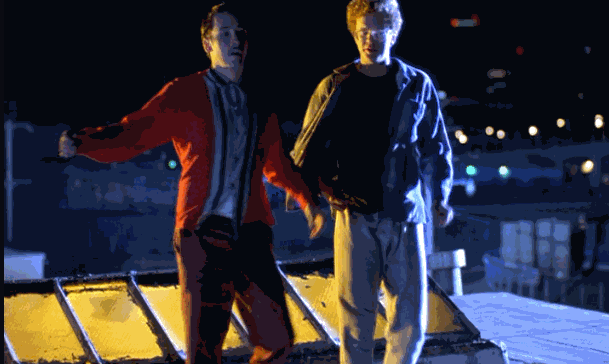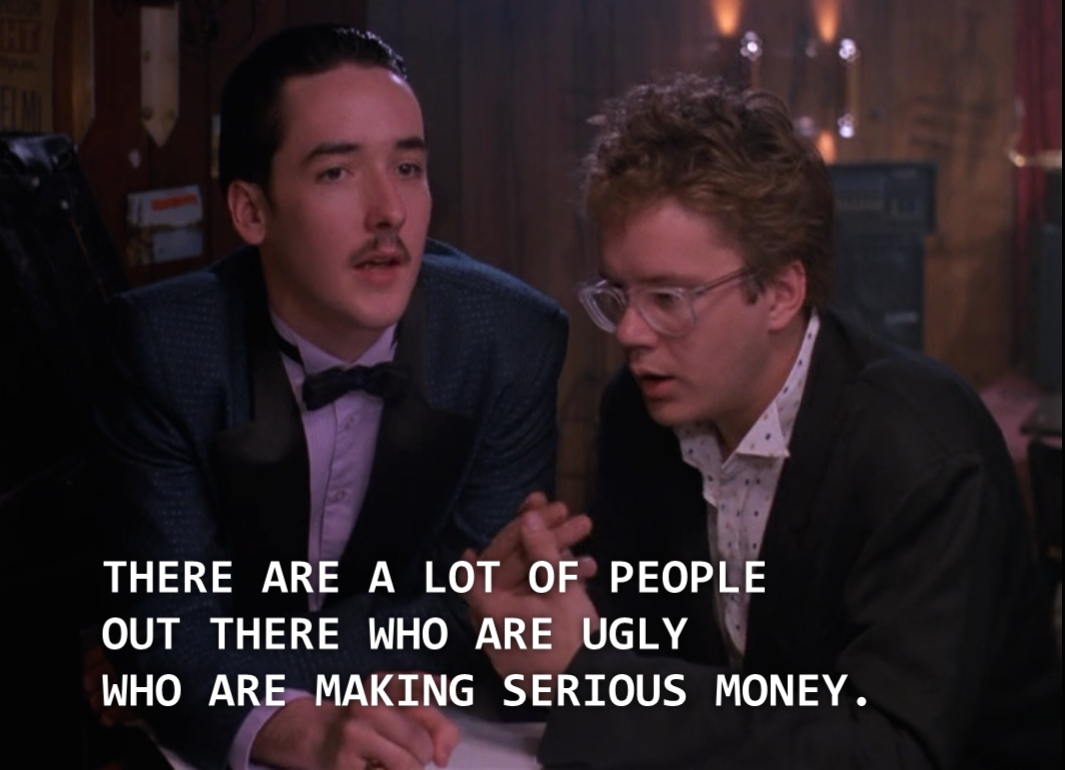Tapeheads is the official movie of Millennials

A normal drive from Ocean City, Md., back to the suburbia of Baltimore County, Md., would usually take three hours, tops. A drive back from Ocean City, Md., with my immediate family—the eleven-year-old half brother, my stepfather, my mother, our pug/chihuahua Milo and our looming Labrador mix Jacoby—usually hits the 6 hour mark and goes past it, as my mother meanders through trailer parks near the water looking for “a place to retire” and we search for that shirt my brother saw on the boardwalk and now wants. On these car rides usually the only thing I can do is look out the window, think a little and listen to music because I suffer from pretty bad motion sickness, and the mere thought of looking at anything with writing reduces me to gagging. So, naturally, as soon as we get home, I checked the small amount in my bank account, purchased an Apple TV and downloaded Nicki Minaj’s entire discography.
Because I was bored.
Apparently, this is what I am generationally predisposed to do. I was born in 1992; I just breach the cusp of those “lost people” that everyone refers to as the Millennials. I know what it’s like to fill the meaningless void of boredom with so many filters and social networks that it makes being bored that much more excruciating. The need to do anything to stave off that boredom, whether it’s purchasing a colourful throw pillow or buying food that you don’t even want, has become so powerfully strong that producers are designing ways to make buying things fun, easy and interesting (think: Super Bowl ads and PayPal). It wasn’t until I was alone in my apartment, eating Chinese food and waiting on a text from my significant whatever, finding anything to do to stay off of FaceBook for a couple of hours, that I rediscovered what I now consider to be the defining movie of the Millennials (and possibly the greatest movie of all time). The only slight, ignorable problem is that it came out in 1988 and the VHS is pretty much defunct. (In a fitting twist, you can stream the movie on Netflix.)

Tapeheads opens with two kids, a sleazy John Cusack (Ivan) and a nerdy Tim Robbins (Josh), trying to beat boredom in a dead-end job as security officers. They throw a massive party in the building they’re guarding, of course, documented entirely on film with some effects thrown over it. To me, it already sounds familiar. I don’t remember the last time I went to some party without someone “documenting” the entire experience either professionally or on their phone. Just the other day, I filmed 80 seconds of video (for Snapchat) of various people and I drunkenly singing David Bowie karaoke songs in a warehouse gallery, all of them edited with the caption “Wow David Bowie” and some kind of stupid filter thrown in. It seems like documenting our happiness and putting it on display for others has become a thing of today.
But Ivan and Josh get fired for it, as you do when you throw a massive party in your office without permission from the higher-ups and then capture the entire thing on film. How many times have you heard that story? Kids go to jail for bragging about their crimes on Twitter, people get fired for committing some kind of social media foul. In this case, Ivan and Josh decide to turn their unemployment into something positive and create a video production company called the Video Aces. From then on the film focuses on recognition, fame and money, but following Wall Street‘s “greed, for lack of a better word, is good,” it says it’s okay to want those things and it’s okay to pursue your own desires. In fact, it reinforces that point so strongly that the film almost gains dream-like qualities; for example, after Josh gets kicked out of his parents’ house for installing technical equipment in the living room, he and Ivan immediately find a gigantic studio space to live-in … for free.

This was probably the message that hit home for me. The Millennial generation is branded as the narcissistic generation. We invented the selfie and the hashtag. In an age of liking and swiping, we’re seen to not give a damn for anyone but ourselves. It’s assumed that our “constant search” for some kind of reinforcement is a lack of ambition and a lack of empathy for people around us. It could be; I don’t know. However, I do know that Tapeheads portrays this with astonishing clarity, as Josh and Ivan disregard any kind of authority (especially their parents) and are unaware of the political subplot unravelling around them. I mean, people die on Josh and Ivan’s journey to stardom, and, although their deaths are completely insignificant after about five minutes of movie time, they contribute to the Video Aces’ popularity and name. Even though there’s seemingly a lack of empathy and a disrespect for anything but themselves, there’s never a point in the movie where Josh and Ivan become hated by the viewer.
The Video Aces get everything handed to them
They face no repercussions for any of their actions. They go into a business with no funds and come out winners of the Video Music Awards. In the first half-hour of the film, when they refuse to do any more free jobs, the viewer expects them to fail because they don’t have “the experience” to go along with their talent. And sure, the next shoot is a disaster, much to the embarrassment of the rock journalist that got them the gig, but the Video Aces’ receive famedom immediately afterwards due to what can only be described as “the pleasure of 1980s proto-hipsters.” And, in the end, all of the Video Aces’ repercussion-less, self-centered actions take them back to their roots and they save a couple of fading musicians of the last generation and expose a corrupt politician (causing him to have a temper tantrum of epic proportions).
If the characterization doesn’t sell the movie enough as the new positive figurehead for the Millennial generation, the movie jumps with cutscenes and dialogue as if it knows your attention span has been shortened by hours spent staring at a computer screen. In one scene they’re trying to figure out how rigs work, and in the next they’re back at the apartment and two women are fighting with nunchucks and switchblades. The hitmen that show up towards the end of the movie seem to forget what they’re doing more often than anyone else in the movie. Every romantic scene has something else going on during it, whether it’s limbo, or someone being lit on fire. The overall chaos draws and holds your attention, even if your attention span has been reduced to 6 seconds.
And, as it can’t be said enough, what makes Tapeheads truly a masterpiece is its positive acceptance. It incorporates the Millennial traits that are thought of as shameful and ego-centric and embraces them. If we’re holding elections, I vote for Tapeheads to be the new mascot of the Millennials. We need some positive reinforcement once in a while for being “shallow,” because sometimes that’s the best path to success and fulfillment. Though, the Video Aces do end up in jail at the end of the movie, so I guess the positivity is up for interpretation.



